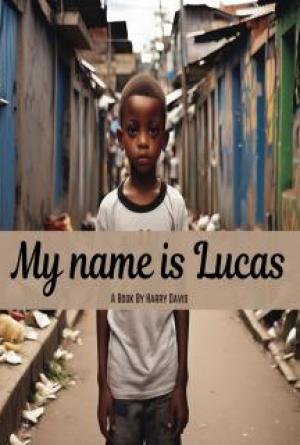ABOUT THE AUTHOR
Bryan Murphy is a British author who travelled extensively as a teacher of English as a foreign language before settling in Italy, where he worked as a translator for a United Nations agency. He now lives in Portugal and concentrates on his own words.
Bryan Murphy's stories have an international following, and his poetry has appeared in places ranging from the Venice Biennale to the Brighton Evening Argus, as well as a multitude of literary magazines.
His short play, Bar Londra, is in the repertory of the Turin Theatre Company. He has appeared as an actor in both plays and films, including the award-winning Italian historical saga Noi Credevamo.
You can find his novel Revolution Number One, published under the pen name Zin Murphy, here:
mybook.to/zin
This is its opening chapter:
Chapter 1
Birthday Boy
The egg lent Joséphine’s thin throat an adam’s apple as it slid down.
“Ten!”
Joséphine diluted the taste with a gulp of her whisky and coke.
Warm autumn air carried the sound of music from the colonies across the city neighbourhood. Inside the party flat, on the top floor of a low-rise apartment block, Simão looked at the remaining hard-boiled eggs, all of them neatly shelled. His face had started to lose its Mediterranean colouring after the fourth egg. Now his skin turned even paler. He reached for the smallest egg, then drew his hand back.
“I can’t.”
“You give up?”
“Yes. I give up.”
Simão looked crestfallen, though his eyes gave away a flicker of relief.
The guests set up a chorus of “Jo-sé-phine! Jo-sé-phine!!” Joséphine raised her skinny arms in triumph.
Ed Scripps observed his young landlady from the back of the room. This was a new side to her. He was glad to see her so enthusiastic about something other than money. His party was warming up.
“Eleven!” he shouted.
Ed wondered whether this party game was a local tradition or a French import. Either way, his landlady had clearly had plenty of practice.
Joséphine grabbed another egg from one of the plates and stuffed it into her mouth. She chewed a couple of times, then swallowed.
“Jo-sé-phine! Jo-sé-phine!!”
“Twelve!” called Ed.
Joséphine paused. Pride fought unease on her face.
“All right,” she said, “but take off that ugly African music and put on one of my beautiful Brazilian records.”
Ed interrupted the voice of Rui Mingas, his own choice, and replaced it with the record he found at the top of the stack of Joséphine’s collection.
Accompanied now by the sound of Maria Bethânia, Joséphine eased her twelfth egg into her mouth and started to chew. Then stopped. Chewed again. She placed one hand on her throat and began to massage it. With her other hand, she snatched her tumbler, raised it to her lips, and took a draught. And another. She belched. The egg was down.
“Jo-sé-phine! Jo-sé-phine!! Jo-sé-phine!!!”
Clutching her belly, Joséphine rushed out of the lounge.
“Don’t go!”
“One more!”
A couple of people patted her as she went past, but no-one risked trying to stop her.
The cries of “Jo-sé-phine!” died down. Conversation resumed, rose and swirled to the background of Brazilian rhythm.
Ed’s guests, Portuguese and foreign, talked mainly about music, cars, football, politics and clothes. And supermarkets, of course, when they spoke to their host. The heated political discussion was a surprise to Ed. He did not expect people to speak so openly, living, as they did, under a fascist regime.
“Things have got to change,” said Hélder, one of his business contacts here in Lisbon. “The days of standing ‘proudly alone’ are over. We’ve got to open up to the outside world and get trading. Like it or not, that means becoming more democratic.”
“It means ending the wars in the colonies,” put in Mário, a friend of one of Ed’s acquaintances back home. “Give them their independence. Let them run their own damned show.”
“Bring our boys home! And keep them here!” This was Lourdes, a woman in her mid-30s whom Ed had met at the rowing club. “Can you imagine it, spending four years in the jungle, with the natives shooting at you?”
Ed shook his head. She was exaggerating, surely?
“Can you picture,” she went on, “what those boys will be like when they get back? Traumatised and dangerous.”
The only dissenting voice was that of Jorge. Ed had met Jorge in a bar frequented by teachers at the Sussex School, a language institute where Ed was taking Portuguese lessons. One of the teachers must have brought Jorge along this evening. Jorge prised Ed away from the group by asking him for a bottle of beer.
“Help yourself,” said Ed. “The beer’s in the fridge in the kitchen.”
“Can you show me where that is, please?”
Ed excused himself and propelled Jorge down the corridor to the kitchen. He opened the fridge, pulled out a bottle of Sagres, handed it to Jorge and went to the drawers to rummage for an opener.
“Must be in the lounge,” he said.
“That’s OK.”
Ed turned to see Jorge drinking from the bottle.
Jorge wiped his luxuriant moustache with the back of his free hand.
“Having one yourself?” he asked Ed.
“Not just yet. I like to get some plain water inside me first. Gotta stay sober in front of my guests.”
“Look, Ed, the things those people were saying, they’ve got it all wrong. You don’t want to listen to them. For one thing, we don’t have any colonies. Mozambique, Angola, Guinea, they are not colonies. They are all part of Portugal, just as much as Lisbon is. Giving them away would be like cutting our arms off!”
Jorge caught Ed’s quizzical expression.
“Ed, tell me, how long have you been in Portugal now?”
“Two months to the day.”
“Right. That’s nothing, is it? Of course you don’t understand the way things are here, what is going on. But with time you’ll get to know us and to respect what we’re doing. We are only doing what we have to do.”
“Ooooh!! What are you two boys doing in here alone?”
The voice was followed into the kitchen by the voluptuous body of Anne, one of the English teachers from the Sussex School. She evidently knew Jorge quite well, because she pushed her hands into the thick hair over his collar and brought his face forward and up to meet her lips, shoving him back against the fridge at the same time. They did not part. Indeed, Jorge’s arms closed around Anne’s back and pulled her tighter to him.
Ed removed the bottle of beer from Jorge’s hand, which then disappeared under the back of Anne’s blouse. Ed placed the bottle on the kitchen table and went back to the lounge, where an argument about music was brewing.
Lourdes wanted to go back to the classical music with which Ed had started the evening. Some of the others were adamant about sticking with Brazilian, or at least South American, music. One or two were arguing loudly for rock. None of them, it appeared, shared Ed’s taste for African music, or wanted to hear Portuguese sounds.
Ed did not recognise the woman at the centre of the argument. He found her attractive, despite her boyish haircut. She was short, olive-skinned and curvaceous. Her eyes were dark and flashed fire to accompany the strong words shaped by her full lips. He reckoned she was about twenty years old. She was waving the disc she wanted played. Ed recognised his copy of Genesis Live. Mário and others had planted themselves between her and the record player, which was playing a number by Chico Buarque that had no words. Every so often, they would supply a chorus with relish. It sounded medical to Ed: “Tantum R” – not much fun. Rock would be better. Especially Genesis.
Ed approached the young woman.
“I see you like Genesis. I got that just before I left England. It’s so new, most people here won’t know it.”
She looked at him steamily.
“Can you just play it?”
“Sure. As long as you dance to it. With me.”
“If that’s what it takes.”
Ed removed the record from her hand and strode over to the player. He turned off Chico Buarque and replaced it with Genesis Live. It was his party, after all.
Genesis were not the easiest of groups to dance to, but on the dance floor, or even in a crowded room at a party, Ed could dance to anything, his slight limp invisible. His partner danced without speaking, lost in the music. When the track finally ended, she hugged Ed, looked up into his eyes, thanked him and drew him into a corner, where she manoeuvred him onto a chair and perched herself on his knee.
“I’m on your level now,” she said, looking him evenly in the eyes, “whoever you are.”
“Ed Scripps. It’s my party.”
“Oh, the supermarket fellow. Who likes classical music.”
“Yes, that’s me – among other things.”
The floor below them began to reverberate with more than the vibrations caused by Genesis. Someone was banging from below.
“Neighbours!” said the source of the warmth spreading along Ed’s thighs.
“I expect they want us to turn the music down a bit,” said Ed. She slid off his knee, pushed her way to the record player and raised the volume even higher. When she got back to Ed, she had two glasses in her hands. She gave the one containing water to Ed and took a sip from the other.
“That’ll teach them,” she said. “Genesis Live is the most important record of this year. A live album by the best live band in the world. It’s got to be heard!”
Ed listened to the music for a couple of minutes, then asked “Who did you come with?”
“I’m a good Catholic girl. Or so my parents think. I come by myself.” She giggled. “But Calvin brought me here. I’m his student at the Sussex School. He teaches me German. And I have a name: Maria da Conceição. Most people call me Ção.”
It sounded awful to Ed.
“I know what you’re thinking. Just nasalise the vowel, then it’ll sound a lot better.”
“Mary of the Conception,” Ed translated.
“It’s a good Catholic name, wouldn’t you say?”
“Kind of sexy, if you think about it.”
“I can tell you are doing just that. Yes you are, don’t deny it. Why don’t you try me sometime, mister blue-eyed handsome man.”
“How about tonight?”
“Not tonight. Unless you can empty this room in the next twenty minutes. I’ve got to head home while the Metro is still running. Mummy and Daddy don’t want their little Conception turning into a pumpkin.”
She slid slowly along Ed’s thigh, letting her short skirt ride up so that he could see her black knickers, then slid slowly back again, exhaling a breathy “Aaah!” into his ear, before standing on her own feet, giving Ed a long sultry gaze, turning, and plunging into the party.
Ed stayed put. He was next to an open window. Warm, damp air blew in, dissipating some of the tobacco smoke, underneath which Ed could smell not only his own perspiration, brought out by the dancing, but also a sweeter aroma left on his clothes. He identified it as cinnamon.
When the second side of Genesis Live had finished, someone put on Milton Nascimento. Ed got up and went to look for Ção, who was no longer in the main room. As the evening progressed, the party had spread to the corridor and the kitchen, but she was not there. Nor was Calvin in evidence. The toilet door was open, the light off. Either she was being a good Catholic girl in one of the bedrooms or she had left. Ed was about to investigate the former possibility when his new friend Rui, a well-connected student of economics, buttonholed him. Rui was tall; almost as tall as Ed, and had the habit of looking people directly in the eye. This evening, though, his gaze was faltering.
“What’s going on, Ed? You stop talking your guests? Here, have some of this.” For once, his enunciation was less than immaculate.
Rui proffered a jug of light red liquid and looked around for Ed’s glass.
“No, thanks, not just yet. What is that? Seems powerful.”
“Nah. Just the opposite. Is água pé. The newest, newest wine. Foot water, it means. After the grapes have been trodden, we tread the grapeskins. Produce this. ’s lovely. Weak, weak, weak. You can drink litres of it without falling in. Over.”
“Sounds disgusting.”
“Nah. ’s lovely. Try some.”
“Not just yet. Have you seen –”
“Nah. She’s not so lovely, under that skin.”
Ed’s fingers tingled at the thoughts that last word evoked.
“Forget the womans. Tell me about supermarket business. What’s new on the shelves?”
“Since you ask, lots of Brazilian products, because they’re mostly Brazilian chains. But that’s not my department. I’m here to introduce loyalty cards. Haven’t I told you?”
“Loyalty schmoyalty!” Rui was a fan of Woody Allen and Philip Roth. “In this country, we are loyalty only to our football team and our Church. And even that … You heard what these people say about our government. And these are the middle glass! You know you gotcha rival?”
“Calvin?”
“Not for Ção, for loyalty. Mark Rotherfield. One other English.”
“He wants to introduce loyalty cards to Portuguese supermarkets?”
“Noooo! Trading stamps. Much better idea. Things people can collect, hoard. You should –”
Rui’s nascent suggestion was aborted by loud, insistent banging on the front door of the flat. Ed wondered why whoever was knocking couldn’t see the bell, but he went to answer all the same. He opened to four men in uniform, behind whom were two who looked like the stereotypical spies from Mad magazine in their hats and raincoats. The uniform nearest him started speaking in rapid Portuguese. It was too fast for Ed to understand. Lourdes appeared at his shoulder and interpreted.
“He says your neighbours have complained about the noise. And about the suspicious people arriving at this flat. So they’re going to check identities.”
“I’m –”
“They know who you are. They’re more interested in your Portuguese guests.”
Lourdes drew her ID card from her handbag and showed it to the policeman. He nodded perfunctorily at it and pushed past them, followed by a companion and the two plain-clothes men. The two other uniformed men stayed at the door.
“Judite and Pides,” Lourdes whispered to Ed.
“Huh?”
“The ordinary police and the so-called secret police. Everyone knows who they are. They’re powerful enough not to need secrecy. Nasty.”
The men in uniform had turned the music off and were glancing cursorily at the ID cards produced by the Portuguese women. One of the Pides was examining those of the men with great care. The other was asking the names of all the foreigners present and writing down their answers.
Without warning, Ed was knocked against the wall as a man rushed past. The man shouldered one of the uniformed police guarding the door out of his way, too, but the second policeman there grabbed his arms from behind and secured them in a full nelson, shouting for his companions to come and help. One of them rushed over and expertly handcuffed the man. One of the Pides sauntered to the doorway and exclaimed, “Look who we have here.”
It was Jorge.
With neither words nor ceremony, the men in uniform marched Jorge down the stairs and out of sight. The two plainclothes men stayed on the threshold of the flat. The harder-looking of the pair told Lourdes they had better not turn the music back on. One of the neighbours who had phoned the police to complain was a retired judge from the colonies. He’d said he had a gun and knew how to use it. Lourdes relayed the information to Ed, who could see that she was badly shaken.
The man turned his sour gaze onto Ed.
“Happy twenty-third birthday, Mr. Scripps,” he said in English.
His companion chuckled, though his eyes stayed cold.
“Good luck with the loyalty cards,” Cold-eyes added.
How did they know that? I’ve never seen these guys before in my life.
The plainclothes men turned and left. The party was over. The guests spoke little as they gathered their coats and hurried away into the night as though a curfew had been imposed.
On her way out, unaccompanied, Lourdes asked Ed if it was really his birthday.
“Well, it was until midnight,” he answered.
“Why on earth didn’t you tell us?”
“I didn’t want anyone bringing presents. Not my style. My party, I provide. Though all your contributions were very welcome.”
Dazed and perturbed, Ed went through the hand-shaking and cheek-kissing routines that he was getting used to, and then he was alone.
Lost in thought, Ed shuffled down the corridor to the bathroom. Inside, there was a stink of vomit, though the toilet bowl, like the sink, was empty. He relieved himself, flushed the toilet, washed his hands and splashed cold water on to his face. As he turned to leave, he heard a groan. Wondering who the police had missed, Ed drew back the shower curtain.
Curled up in the bath, fully clothed, clutching her belly, was Joséphine. She was so thin that Ed was able to lift her out of the bath and carry her to the room she set aside for herself for her occasional visits and trysts.
Ed laid her in the middle of the broad bed and put a blanket over her. Then he fetched a large jug of water and set it on her bedside stand. Over the bed, a giant poster of Joséphine looked down benignly on its occupant. She was muttering something. Ed bent to listen.
“Who turn off my beautiful Brazilian?”
Ed left Joséphine’s bedroom and closed the door behind him. He went into the kitchen, located an untouched bottle of água pé, and took it into the lounge. He resumed his seat by the window, which he now closed. Ed sat drinking from the bottle as he pondered the evening’s events and his nose sifted the room’s layered scents for a hint of cinnamon.
To read the whole novel, go here for the paperback:
mybook.to/zin
or here for the e-book:
https://www.free-ebooks.net/drama/Revolution-Number-One







